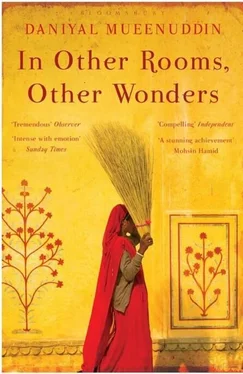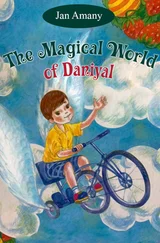Nawab’s day, viewed from the air, would have appeared as aimless as that of a butterfly — to the senior manager’s house in the morning, where he diligently paid his respects, then sent to one or another of the tube wells, kicking up dust on the unpaved field roads, into the town of Firoza, zooming beneath the rosewoods, a bullet of sound, moseying around town, sneaking away to one of his private interests, to cement a deal to distribute ripening early-season honeydews from his cousin’s vegetable plot, or to count before hatching his half share in a flock of chickens, then back to Dunyapur, and out again. The maps of these days, superimposed, would have made a tangle; but every morning he emerged from the same place, just as the sun came up, and every evening he returned there, tired now, darkened, switching off the bike, rolling it over the wooden lintel of the door leading into the courtyard, the engine ticking as it cooled. Nawab each evening put the bike on its kickstand, and waited for his girls to come, all of them, around him, jumping on him. His face often at this moment had the same expression, an expression of childish innocent joy, which contrasted strangely and even sadly with the heaviness of his face and its lines and stubble. He would raise his nose and sniff the air, to see if he could find out what his wife had cooked for dinner; and then he went in to her, finding her always in the same posture, making him tea, fanning the fire in the little hearth.
‘Hello, my love, my chicken piece,’ he said tenderly one evening, walking into the dark hut that served as a kitchen, the mud walls black with soot. ‘What’s in the pot for me?’ He opened the cauldron, which had been displaced by the kettle onto the beaten-earth floor, and began to search around in it with a wooden spoon.
‘Out! Out!’ she said, taking the spoon and, dipping it into the curry, giving him a taste. He opened his mouth obediently, like a boy receiving medicine. The wife, despite bearing thirteen children, had a lithe strong body, her vertebrae visible beneath her tight tunic. Her long mannish face still glowed from beneath the skin, giving her a ripe ochre coloring. Even now that her hair had become thin and graying, she wore it in a single long pigtail down to her waist, like a young woman in the village. Although this style didn’t suit her, Nawab saw in her still the girl he married sixteen years before. He stood in the door, watching his daughters playing hopscotch, and when his wife went past, he stuck out his butt, so that she rubbed against it as she squeezed through.
Nawab ate first, then the girls, and finally his wife. He sat out in the little courtyard, burping and smoking a cigarette, looking up at the crescent moon just coming onto the horizon. I wonder what the moon is made of? he thought, without exerting himself. He remembered listening on the radio when the Americans said they had walked on it. His thoughts wandered off into all sorts of tangents. The dwellers around him in the little hamlet had also finished their dinner, and the smoke from the cow-dung fires hung over the darkening roofs, a harsh spicy smell, like rough tobacco. Nawab’s house had all sorts of ingenious contrivances, running water in all three rooms, a duct that brought cool air into the rooms at night, and even a black-and-white television, which his wife covered with a flowered doily that she had herself embroidered. Nawab had constructed a gear mechanism, so that the antenna on the roof could be turned from inside the house to improve reception. The children sat inside watching it, with the volume blaring. His wife came out and sat primly at his feet on the charpoy, a bed made of rope.
‘I’ve got something in my pocket — would you like to know what?’ He looked at her with a pouting sort of smile.
‘I know this game,’ she said, reaching up and straightening his glasses on his face. ‘Why are your glasses always crooked? I think one ear’s higher than the other.’
‘Come on, if you find it you can have it.’
Looking to see that the children all had become absorbed in the television, she kneeled next to him and began patting his pockets. ‘Lower … Lower …’ he said. In the pocket of the greasy vest that he wore under his kurta she found a wrapped-up newspaper holding chunks of raw brown sugar.
‘I’ve got lots more,’ he said. ‘Look at that. None of this junk you buy in the bazaar. The Dashtis gave me five kilos for repairing their sugarcane press. I’ll sell it tomorrow. Come on, make us some parathas . For all of us? Pretty please?’
‘I put out the fire.’
‘So light it. Or rather, you just sit here, I’ll light it.’
‘You can never light it, I’ll end up doing it anyway,’ she said, getting up.
The smaller children, smelling the ghee cooking on the griddle, crowded around, watching the brown sugar melt, and finally even the older girls came in, though they haughtily stood to one side.
Nawab, squatting and huffing on the fire, gestured to them. ‘Come on you princesses, none of your tricks. I know you want some.’
They began eating, pouring the brown crystallized syrup onto pieces of fried bread, and after a while Nawab went to his motorcycle and pulled from the panniers another hunk of the sugar, challenging the girls to see who would eat most.
One evening a few weeks after his family’s little festival of sugar, Nawab was sitting with the watchman who kept the stores at Dunyapur. A banyan planted over the threshing floor only thirty years ago had grown a canopy of forty or fifty feet, and all the men who worked in the stores tended it carefully, watering it with cans. The old watchman sat under this tree, and Nawab and others of the younger generations would sit with him at dusk, teasing him, trying to make his violent temper flare up, and joking around with each other. They would listen to the old man’s stories, of the time when only dirt tracks led through these riverine tracts and the tribes stole cattle for sport, and often killed each other while doing it, to add piquancy.
Though spring weather had come, the watchman still burned a fire in a tin pan, to warm his feet and to give a center to the little group that gathered there. The electricity had failed, as it often did, and the full moon climbing the horizon lit the scene indirectly, reflecting off the whitewashed walls, throwing dim shadows around the machinery strewn about, plows and planters, drags, harrows.
‘Come on, old man,’ said Nawab to the watchman, ‘I’ll tie you up and lock you in the stores to make it look like a robbery, and then I’ll top off my tank at the gas barrel.’
‘Nothing in it for me,’ said the watchman. ‘Go on, I think I hear your wife calling you.’
‘I understand, sire, you wish to be alone.’
Nawab jumped up and shook the watchman’s hand, making a little bow, touching his knee in deference, a running joke; lost on the watchman these last ten years.
‘Be careful, boy,’ said the watchman, standing up and leaning on his bamboo staff, clad in steel at the tip.
Nawab kicked over his motorcycle with a flourish, and in one smooth motion flicked on the lights and shot out the threshing floor gates, onto the quarter-mile drive that led from the heart of the farm. He felt cold and liked it, knowing that at home the room would be baking, the two-bar heater running day and night all winter on pilfered electricity. Turning onto the black main road, he sped up, outrunning the weak headlight, as if he were racing forward in the globe of a moving lantern. Nightjars perching on the road as they hunted moths ricocheted into the dark, almost under his wheel. Nawab locked his arms, fighting the bike as he flew over potholes, enjoying the pace, standing on the pegs, and in low-lying fields where the sugarcane had been heavily watered, mist rose and cool air enveloped him. At the canal he slowed, hearing the water rushing over the locks.
Читать дальше












